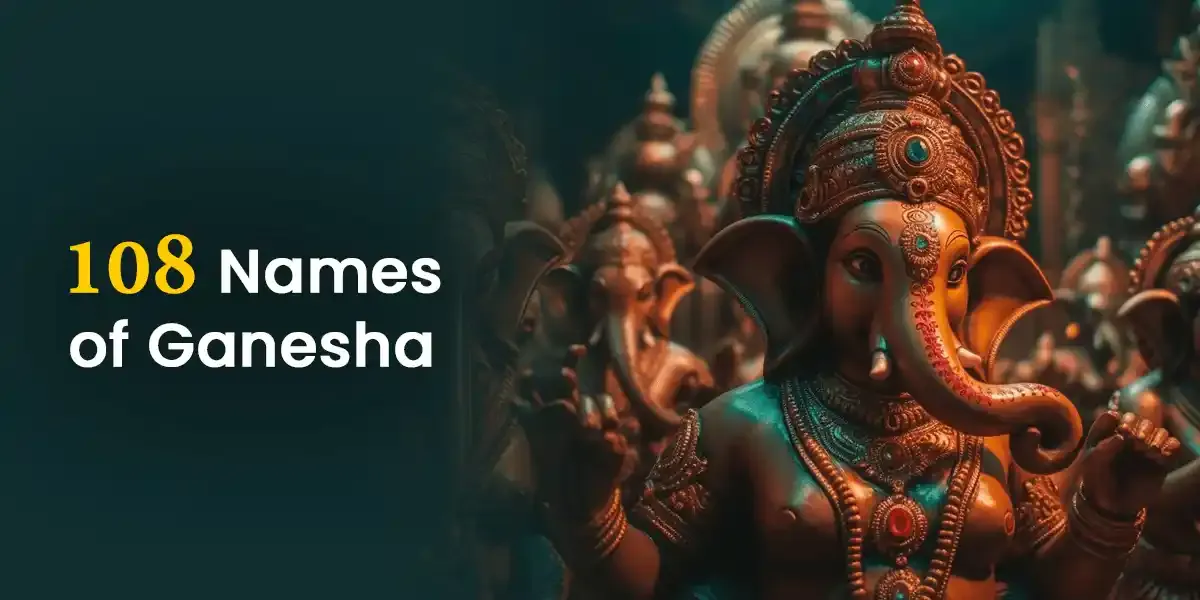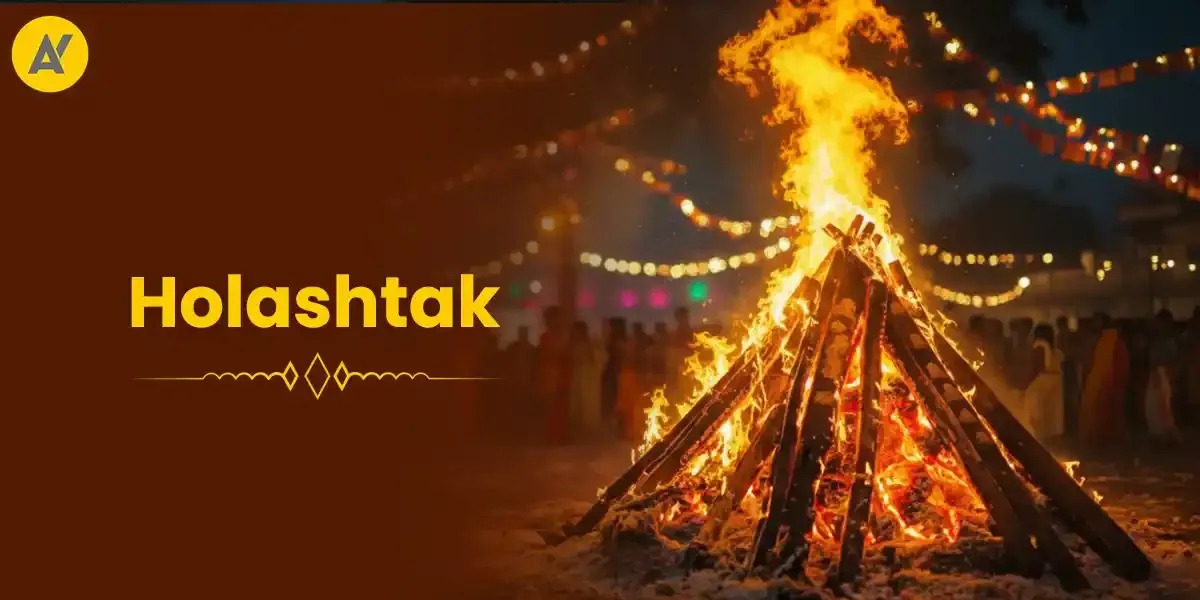
In Hindu tradition, Lord Ganesha, also known as Ganpati, is the beloved son of Lord Shiva and Goddess Parvati. Revered as the remover of obstacles and the god of beginnings, wisdom, and prosperity, Ganesha holds a special place in the hearts of devotees around the world.
People often worship him by invoking his many names, each reflecting a unique aspect of his divine nature. Chanting or meditating on the 108 names of lord Ganesha is believed to bring blessings, spiritual growth, and success in all endeavors.
Let’s discover all 108 names of Ganesha and uncover the profound meanings behind each one.
108 Different Names of Lord Ganesha and Their Meaning
Each name of Lord Ganesha reveals a special quality or power. These names help us understand and connect with different aspects of his divine nature. Let's explore all 108 names and their beautiful meanings.
Akhuratha - The divine one whose vehicle is the humble mouse
Alampata - He who exists beyond time and remains eternal
Amit - The one who cannot be compared to anyone
Anantachidrupam - Embodiment of endless consciousness and awareness
Avaneesh - The supreme ruler over all creation
Avighna - He who clears away all barriers and difficulties
Balaganapati - The beloved child form of Ganapati
Bhalchandra - The one adorned with the crescent moon on his forehead
Bheema - Possessing tremendous size and strength
Bhupati - The divine master of all celestial beings
Bhuvanpati - Supreme lord who governs all deities
Buddhinath - The divine master of intellect and understanding
Buddhipriya - He who blesses devotees with knowledge and wisdom
Buddhividhata - The divine source of all intelligence
Chaturbhuj - Possessing four powerful arms
Devadeva - The supreme deity above all gods
Devantakanashakarin - Mighty destroyer of demons and evil forces
Devavrata - He who graciously accepts all sincere devotions
Devendrashika - The divine guardian of all heavenly beings
Dharmik - One who embodies and encourages righteous giving
Durja - The unconquerable and invincible form
Dvaimatura - Born blessed with two divine mothers
Ekaakshara - Represented by the sacred syllable Om
Ekadanta - He who bears one magnificent tusk
Ekadrishta - The one with unwavering concentration
Eshanputra - The blessed son of Mahadeva Shiva
Gadadhara - Wielder of the powerful mace
Gajakarna - Blessed with elephant-like ears
Gajanana - The beloved one with an elephant's face
Gajananeti - Known far and wide as the elephant-faced deity
Gajavakra - Possessing the graceful curved trunk
Gajavaktra - He whose mouth resembles an elephant's
Ganadhakshya - Supreme chief of all divine groups
Ganadhyakshina - Commander of all cosmic forces
Ganapati - The revered leader of celestial beings
Gaurisuta - Beloved offspring of the fair goddess Parvati
Gunina - Perfect embodiment of all noble qualities
Haridra - Radiant with a golden hue
Heramba - The cherished son of the divine mother
Kapila - Glowing with a tawny complexion
Kaveesha - Divine inspiration for all poets and artists
Keshava - Another form of the supreme Lord
Kripalu - Overflowing with compassion and mercy
Krishapingaksha - Eyes shining like golden-brown jewels
Kshamakaram - The eternal dwelling of forgiveness
Kshipra - Quick to respond to devotees' prayers
Lambakarna - Adorned with long, graceful ears
Lambodara - He with the distinctively large belly
Mahabala - Possessing immeasurable divine strength
Mahaganapati - The greatest among all Ganapatis
Maheshwaram - The supreme controller of existence
Mangalamurti - Divine form that brings all auspiciousness
Manomay - He who captivates and wins all hearts
Mrityuanjaya - Victorious over death itself
Mundakarama - The ultimate source of joy and bliss
Muktidaya - Generous giver of spiritual liberation
Musikvahana - Riding majestically upon a mouse
Nadapratithishta - Divine lover of music and sound
Namasthetu - He who washes away sins and sorrows
Nandana - The delightful son of Shankara
Nideeshwaram - Benevolent bestower of riches and abundance
Omkara - The sacred sound Om personified
Pitambara - Clothed in radiant yellow garments
Pramoda - Supreme master of all sacred spaces
Prathameshwara - The primordial deity worshipped before all others
Purush - The complete and perfect divine being
Rakta - Glowing with a reddish complexion
Rudrapriya - Most dear to Lord Rudra Shiva
Sarvadevatman - He who receives worship from all gods
Sarvasiddhanta - Divine teacher of all arts and sciences
Sarvatman - Universal guardian of all existence
Shambhavi - Precious child of Goddess Parvati
Shashivarnam - Complexion bright as the moon
Shoorpakarna - Distinguished by his expansive ears
Shuban - Pure embodiment of all that is auspicious
Shubhagunakanan - Treasure house of virtuous qualities
Shweta - Pure and radiant as white light
Siddhidhata - Gracious giver of achievements and success
Siddhipriya - He who delights in fulfilling wishes
Siddhivinayaka - Supreme bestower of all accomplishments
Skandapurvaja - Respected elder brother of Kartikeya
Sumukha - Blessed with a beautiful, auspicious countenance
Sureshwaram - Supreme among all divine lords
Swaroop - Divine appreciator of true beauty
Tarun - Forever youthful and timeless
Uddanda - Fierce opponent of all evil
Umaputra - Beloved son of Goddess Uma
Vakratunda - Distinguished by his curved trunk
Varaganapati - Liberal grantor of divine blessings
Varaprada - Generous fulfiller of devotees' prayers
Varadavinayaka - Supreme giver of success and victory
Veeraganapati - Courageous and valiant form of Ganapati
Vidyavaridhi - Infinite ocean of wisdom and learning
Vighnahara - He who removes all obstacles effortlessly
Vignaharta - Powerful destroyer of hindrances and problems
Vighnaraja - Supreme king over all obstacles
Vighnarajendra - Ultimate lord who commands all barriers
Vighnavinashanaya - Complete annihilator of impediments
Vigneshwara - Divine master of all obstacles
Vikat - Possessing an awesome, formidable form
Vinayaka - Supreme leader worshiped by all
Vishwamukha - The cosmic face of the universe
Vishwaraja - Majestic emperor of the entire world
Yagnakaya - Divine recipient of all ritual offerings
Yashaskaram - Generous bestower of glory and success
Yashvasin - Forever popular and beloved by all
Yogadhipa - Supreme master of yoga and meditation
Yugadhipa - Eternal lord who transcends all ages
Why Do We Chant the 108 Names of Ganesha?
Chanting the 108 names of Lord Ganesha is a sacred practice with deep spiritual significance. Here's why devotees engage in this divine recitation:
Spiritual Purification
Each name of Lord Ganesha carries a unique vibration and energy. When chanted with devotion, these names help purify the mind, body, and soul, removing negative thoughts and creating a positive aura around the devotee.
Removal of Obstacles
As Vighnaharta (remover of obstacles), invoking Ganesha's different names helps overcome various challenges in life. Whether facing difficulties in career, relationships, health, or spiritual growth, chanting these names is believed to clear the path to success.
Enhanced Focus and Concentration
The practice of reciting 108 names requires concentration and mindfulness. This repetitive, meditative process helps calm the restless mind, improve focus, and develop mental discipline, qualities that Lord Ganesha himself embodies as Buddhipriya (knowledge bestower).
Also Read:-Lord Ganesha - How to perform Ganesha Puja?
Blessings for New Beginnings
Lord Ganesha is worshiped at the start of any new venture, ceremony, or important event. Chanting Ganpati's 108 names invokes his blessings for auspicious beginnings and ensures success in new endeavors.
Connection with Divine Consciousness
Each name reveals a different aspect of Ganesha's divine nature. By meditating on these names, devotees develop a deeper understanding of the divine and strengthen their spiritual connection with the supreme consciousness.
Manifestation of Desires
Many devotees chant these names while seeking fulfillment of specific wishes. As Varaprada (granter of wishes) and Siddhidhata (bestower of success), Ganesha is known to bless sincere devotees with the fulfillment of their righteous desires.
Protection from Negative Energies
The vibrations created by chanting Ganesha's names form a protective shield around the devotee, warding off negative energies, evil influences, and misfortune.
Discover how Lord Ganesha's blessings can transform your life. Talk to an astrologer on Astroyogi today. Our expert astrologers can help you choose the right prayers, rituals, and auspicious times for your spiritual practices.
To Conclude
Each 108 names of Ganesha holds special spiritual power and connects us to his divine blessings. You can chant these names during your morning prayers, on Ganesh Chaturthi, or anytime you face challenges.
The most important thing is to chant with true devotion and faith. Let each name touch your heart and bring Ganesha's special qualities into your life.
May Lord Ganesha, the Vighnaharta and Buddhinath, bless you with wisdom, remove all obstacles from your path, and guide you toward success, prosperity, and spiritual enlightenment.
Om Gam Ganapataye Namaha!
Our in-house team of writers comprises of vibrant, like-minded, and curious souls who are passionate about helping people find joy and motivation through the magic of words. Our writers are keen on using their skills to make the study of divination sciences a guiding tool in people's lives. They hold expertise in writing on a myriad of topics related to Indian Astrology, Spirituality, Planetary Movements, Vastu Shastra, Numerology, and Tarot among several others. The Astroyogi team aims to write articles that can help the readers lead a life of peace and tranquility whilst enjoying the many ups and downs of life!



















